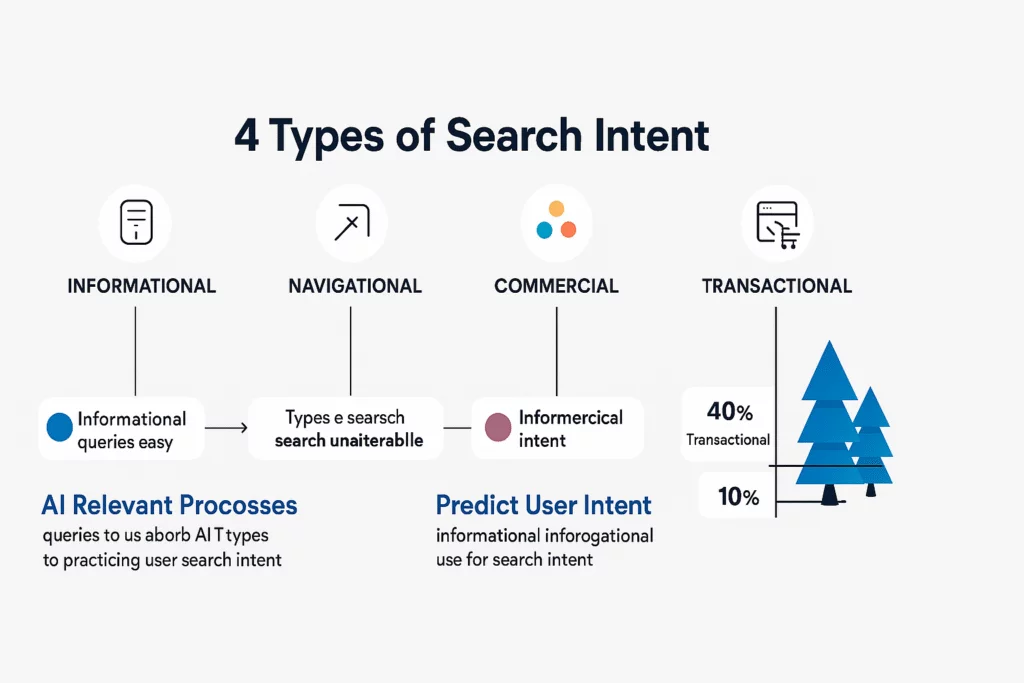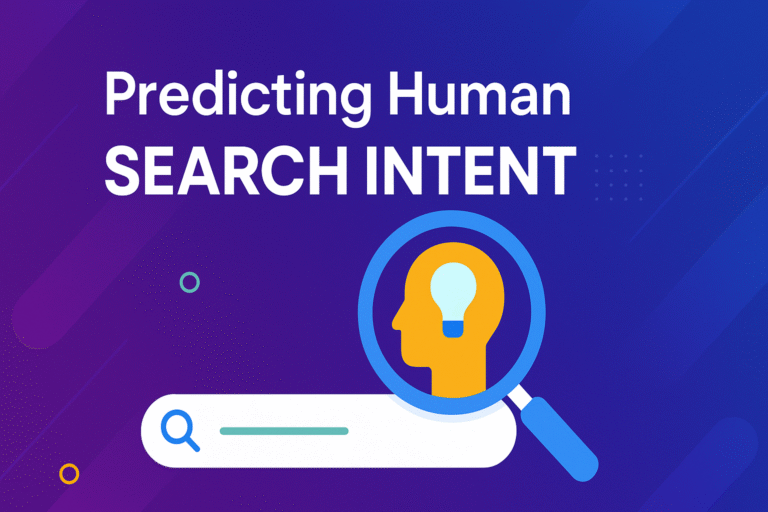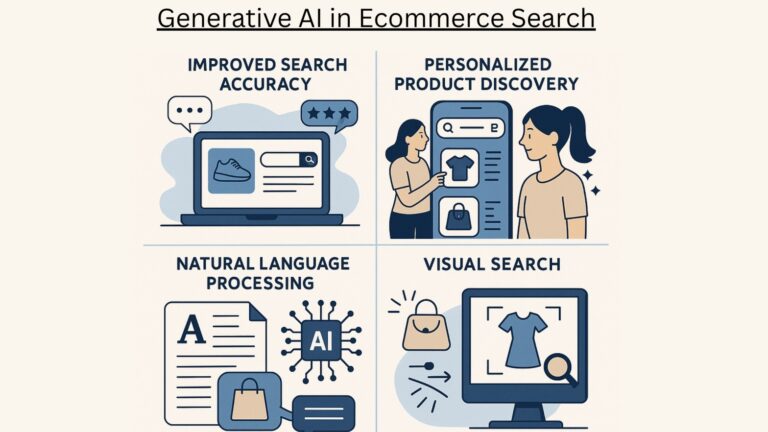In today’s data-rich digital landscape, understanding why users search for specific terms—known as search intent—is more than just a marketing advantage. It’s a necessity for businesses that want to deliver precisely what their audience is looking for and to stand apart from the competition. With advancements in artificial intelligence (AI), companies are now able to predict and respond to search behavior more accurately than ever before, tailoring experiences for every type of query.
This blog explores how AI predicts human search intent—especially commercial intent—and how implementing solutions like Expertrec’s can transform your online presence. The content is designed to be value-driven, offering technical depth, practical strategies, and clear steps to integrate these insights into your digital marketing and search infrastructure.
What is Search Intent?
Search intent is the underlying goal a user has when entering a query into a search engine. Recognizing this intent helps companies craft content, optimize interfaces, and boost conversion rates. There are four primary types:
- Informational: Users are looking for facts, answers, or guides.
- Navigational: Users aim to reach a specific website or a particular section of it.
- Commercial: Users are in the research phase—comparing options and seeking value.
- Transactional: Users are ready to make a purchase or complete an action immediately.
By classifying queries into these groups, businesses can present tailored results—ranging from educational content and blog posts to product pages and service descriptions.

The Role of AI in Predicting Search Intent
AI’s ability to derive meaning from vast amounts of data has revolutionized how we understand search behavior. Here’s how AI contributes:
Deep Learning & Natural Language Processing (NLP)
- Semantic Analysis:
AI-powered systems go beyond keyword matching. They analyze entire sentences and context to determine the underlying intent. For example, the query “best coffee maker under $100” is immediately flagged as having a commercial intent through semantic algorithms that interpret price, product, and user preference. - Sentiment Analysis:
By evaluating the tone and sentiment behind reviews or queries, AI can help predict if a user is satisfied, seeking alternatives, or ready to convert based on their feelings about a product.
User Behavior Analytics
- Historical Data Patterns:
AI models analyze past user behavior, including click paths, dwell time, and conversion rates to refine future predictions. Machine learning algorithms continuously learn, ensuring the system adapts to evolving patterns. - Real-Time Adaptation:
Many AI tools can adjust search results dynamically based on current trends and user interactions, ensuring that the output remains relevant and timely.
Technical Architecture
- Data Collection & Indexing:
Modern AI-driven systems like those powered by Expertrec collect and index vast amounts of website content and user interactions. This robust indexing enables quick retrieval of data that closely matches the user’s query intent. - Predictive Algorithms:
Advanced predictive algorithms identify patterns and forecast the likely progression of a user’s search journey. By using features like word embeddings and neural networks, these systems can gauge subtle differences in query context.
How Machine Learning Predicts Search Intent
1. Data Preprocessing
Engineers clean, normalize, and encode raw data such as user queries, clickstreams, and interaction logs. They apply NLP techniques like tokenization and stemming to break down and structure text inputs effectively.
2. Feature Extraction
Data scientists extract both statistical features (like TF-IDF) and deep learning features (like word embeddings from Word2Vec or BERT). These features create a rich vector representation that captures the context and semantics of each query.
3. Model Training
Developers train supervised learning models on labeled datasets, teaching them to classify queries by intent. As the model runs in production, they enhance it using reinforcement learning techniques that adapt to real-time user behavior.
4. Evaluation & Optimization
Teams track performance using precision, recall, and F1 score. They build continuous feedback loops that refine the model, ensuring it evolves with changing user patterns and search trends.
5. Deployment & Integration
Once the team optimizes the model, they deploy it into the live search engine. The system then delivers real-time intent prediction, fueling personalized results and smarter recommendations.
Let me know if you’d like this section formatted into a code block or slide-style copy for design purposes.
AI in eCommerce
Consider an eCommerce platform specializing in consumer electronics. By integrating AI-powered search analysis:
- User Journey Analysis:
The system identifies that users searching for “budget laptops for gaming” are not only comparing prices but also reading reviews and specifications. - Personalized Content Delivery:
Based on the analysis, the platform dynamically presents a curated list of laptops along with expert reviews, comparison charts, and user testimonials—catering specifically to a commercial intent. - Increased Conversion Rates:
With better alignment of content to user intent, the platform experiences a significant uplift in engagement and, ultimately, sales conversion rates.
Such case studies demonstrate how blending AI with robust search strategies can yield tangible business benefits.
Expertrec: Enhancing Your Search Experience
Expertrec stands out as a leading solution provider in AI-powered search. Their platform is designed to harness the power of AI to enhance user experiences and boost commercial performance. Key features include:
- Semantic Search Capability:
Understands user queries contextually, offering more accurate search results that go beyond mere keyword matching. - Personalized Recommendations:
Utilizes machine learning to suggest products or content based on individual user behavior and historical data. - Rapid Integration:
Allows businesses to implement advanced search functionalities without extensive redevelopment or coding overhead. - Scalable Solutions:
Whether you’re a small startup or a large enterprise, Expertrec adapts to your needs, ensuring you never miss an opportunity to engage your audience.
By integrating Expertrec’s AI-based search solutions, businesses can ensure that their users are met with highly relevant, personalized experiences that drive conversions and satisfaction.
Ready to transform your search capabilities and boost your conversion rates?
Explore Expertrec’s AI-powered solutions today and experience the future of search that truly understands your users.
Technical Implementation Tips
For those looking to implement or enhance AI-powered search solutions, here are some technical pointers:
- Data Infrastructure:
Ensure your backend data infrastructure can handle large volumes of traffic and data processing efficiently. Tools like Expertrec can be paired with machine learning platforms for real-time search analytics. - Algorithm Selection:
Experiment with various algorithms such as Convolutional Neural Networks (CNNs) for image searches or Transformers (e.g., BERT) for text-based queries. Regularly update and fine-tune your models to adapt to user behavior changes. - User Privacy:
When collecting and analyzing data, maintain transparency with your users. Adhere to privacy guidelines and regulations (such as GDPR) to build trust and protect user data. - Performance Monitoring:
Utilize A/B testing to compare the performance of new search features. Employ key performance indicators (KPIs) such as conversion rates, bounce rates, and average session duration to measure impact.
Conclusion
Predicting human search intent is at the heart of optimizing digital experiences. By leveraging AI-driven techniques and tools like Expertrec, businesses are now better equipped to understand user needs, tailor content accurately, and convert opportunities into tangible revenue gains. Whether you’re an eCommerce platform or a content-rich website, integrating advanced search strategies can set you apart in a competitive digital landscape.
Frequently Asked Questions (FAQs)
AI leverages NLP and machine learning to analyze query context, past behavior, and semantic meaning. It deciphers underlying patterns that indicate whether the intent is informational, navigational, commercial, or transactional.
Aligning your content with user intent leads to improved engagement, more accurate targeting, enhanced user satisfaction, and higher conversion rates.
Yes, modern AI chatbots are trained on vast datasets and equipped with NLP models that allow them to interpret ambiguous queries accurately and provide contextually appropriate responses.
Not at all. Expertrec offers a streamlined integration process, ensuring businesses can quickly deploy advanced search functionalities without overhauling their existing systems.
Predictive analytics use historical data and real-time patterns to anticipate user needs, thereby presenting more relevant content or product suggestions that align with their intent.




